Darrell Brooks trial: Defendant's interviews played for the jury

Darrell Brooks trial: Defendant's interviews played for the jury
Police say during interviews in the hours and days after the Waukesha Christmas parade attack, Darrell Brooks offered a different story than what the evidence presented. When police tried to connect the dots, the detective who questioned Brooks said things just didn't add up.
WAUKESHA, Wis. - Witness testimony resumed Tuesday morning, Oct. 18 in the Darrell Brooks trial, charged in the November 2021 Waukesha Christmas parade attack. At least one more day of state witnesses is expected before prosecutors plan to rest their case.
There was just one witness on the stand for the state Tuesday, along with one witness for the defense – called out of order due to the need for an interpreter.
Tuesday's testimony focused on law enforcement interrogations of Brooks after his arrest on Elizabeth Street shortly after the Christmas parade attack.
State offers warning regarding Brooks' interrogation audio/videos
To begin the day Tuesday, Brooks again brought up subject matter jurisdiction, as he always does.
Judge Jennifer Dorow noted a second copy of her written statement on this matter was provided to Brooks.
"I know you saw it because you tore it up yesterday," said Dorow. "You are mistaken or wrong about the law that it needs to be verified or proven. I'm going to continue with his trial whether you believe jurisdiction has been proven for the record or not."
"It has not been proven," said Brooks.
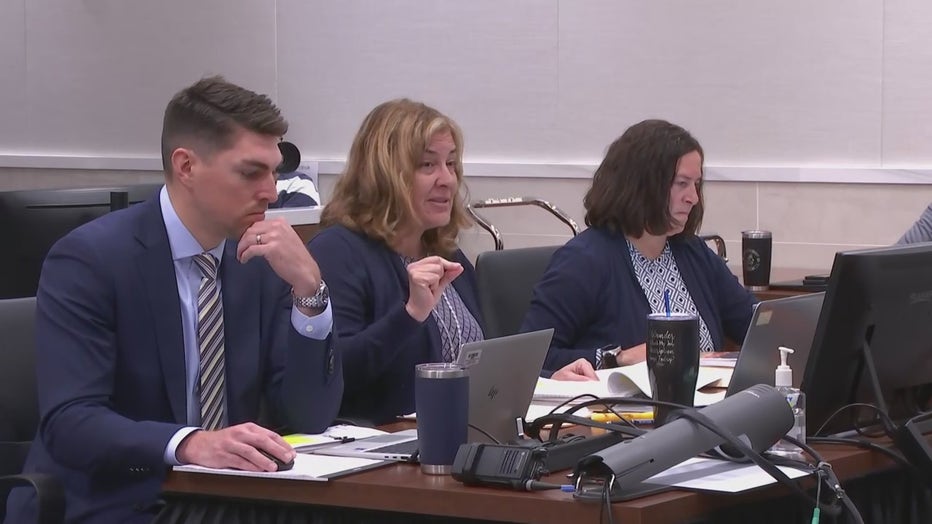
Prosecution in court Oct. 18
The state then issued a warning about audio and video that would be played in court. Deputy District Attorney Lesli Boese noted that she "tried hard" to pull snippets from these interviews with Brooks because there were "a lot of references to prior domestics with Erika (Patterson, Brooks' ex-girlfriend), along with his prior record, "things that the court has previously excluded."
Boese noted that she pulled specific time ranges so that nothing that was previously ruled inadmissible would come in.
She said that while Brooks would obviously have the opportunity to cross-examine the witness, him asking for the interviews to be replayed at a random timestamp could "open the door" to that evidence that had been previously ruled inadmissible.
"If the defendant brings it out into the presence of the jury, then I'm going to be compelled to address it," said Boese, noting that Brooks would be doing so "at his own risk."
The judge reinforce the statements made by Boese.
Brooks was then asked about a jury instruction that would be read to the jury before the testimony of Juan Martinez, a Brooks witness called out of order due to the need for a Spanish interpreter. This jury instruction had to deal with the interpreter – telling the jury the English interpretation would be the evidence in this situation.
Brooks argued that the "jury should hear whatever they need to hear."
As the jury entered Tuesday morning, Brooks fought with Dorow over his inmate communication forms. She again advised him she was not the custodian of the records, and he would need to take up his concerns with the clerk of courts.
"This is ridiculous," said Brooks. "Just like subject matter jurisdiction hasn’t been proved. Just like you’re making judicial determinations that you don’t have to prove anything by law, which is a tacit agreement by you, your Honor."

Darrell Brooks trial: Brooks rolls eyes at judge prior to start of Tuesday testimony
Before testimony started on Tuesday, Oct. 18, Darrell Brooks and Judge Jennifer Dorow had a tense exchange that lasted more than ten minutes. it ended with the entry of the jury into the courtroom.
Detective Jay Carpenter, interviewed Darrell Brooks
First to take the stand on Tuesday was Detective Jay Carpenter. The state proceeded to play an audio recording of Brooks speaking with Carpenter with two FBI agents at Waukesha Memorial Hospital.
In that interview, Brooks seems to be surprised that FBI agents have shown up.
"FBI. FBI?!" he said.
"We’re just kind of helping out because we’re so short-staffed tonight, so that’s all it is," an agent said.
"Y’all for real? The FBI for real?" Brooks later said.
"We get that reaction from most people," the agent said.
"No cause it’s like, am I in a movie right now?" asked Brooks. "Y’all pranking me or something?"
Carpenter then began speaking with Brooks, indicating he had "one side" of the story and needed "Darrell's side."

Darrell Brooks trial: Audio from Brooks interview played in court
Audio from an interview of Darrell Brooks was played in court for the state's case.
In speaking with Carpenter, Brooks had light chatter, talk that included Brooks' children, where he went to high school and even Brooks mentioning this was the first time he had ever talked with anyone from the FBI.
"I was just like, I need to get a Uber. I have money on my Cash App card. I’m not trying to rob anybody! I’m not trying to break in, and obviously, you can tell I’m not drunk. I’m not under the influence of anything," Brooks told Carpenter, referencing reports of someone going door-to-door on Elizabeth Street.
Brooks eventually told Carpenter he did not want to speak with him.
From the hospital, Brooks was transported to the Muskego Police Department.
"Stood by while some basic medical questions were asked by Muskego PD…" said Carpenter. "Once Brooks was in his cell, I informed Brooks I would be returning the next day."
Carpenter and Detective Stern returned the next day for another interview with Brooks. Carpenter said that morning, he learned more information about the Frame Park domestic incident between Brooks and Patterson that prosecutors say preceded the parade attack.
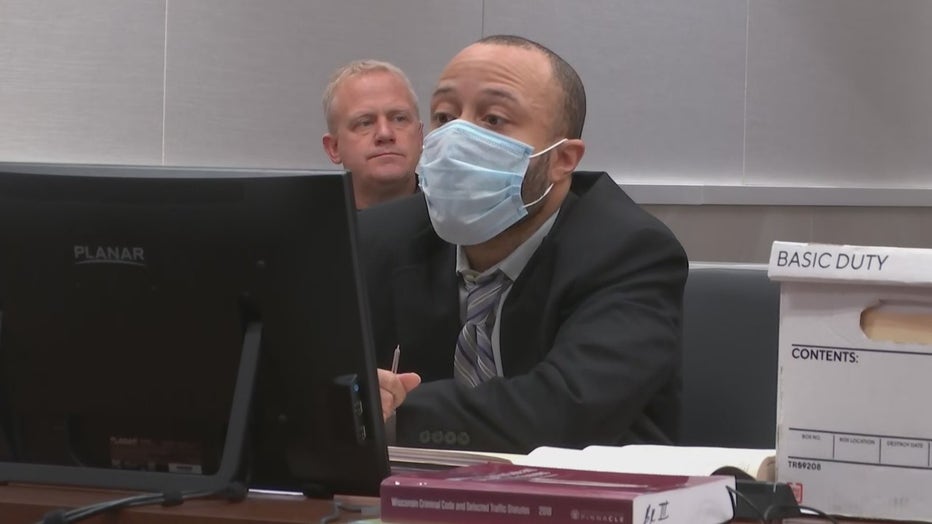
Darrell Brooks
In the second interview clip played in court, Brooks talked about his job, his kids and his girlfriend.
"Only thing I want to know is why in the hell am I being charged with anything?" said Brooks, noting Patterson's allegations against him were "total BS."
"She’s the one that acts the fool, and I’m the one that pays for it!" Brooks added.
Brooks said he came to Waukesha Nov. 21 to watch the Packers game with a friend at a house, but he could not provide the address or the last name of his friend.
When asked about Patterson, Brooks said he was meeting with her because she had been holding money for him. He said he told her, "I'm not supposed to be around you."
"I love you to death. You my baby mama. I’ll meet up with you to get the money. I’m not going to have sex with you. I’m not going to hang out with you. None of that," said Brooks.
Brooks again asked to know what he was being charged with.
"Listen, Carpenter, you’ve been straight with me. I just want to know what am I looking at, so I can let my girls know," said Brooks.
At this point, the Spanish interpreter was available, so Brooks' witness, Juan Marquez, was called out of order.
Juan Marquez, witness for the defense
Juan Marquez testified that he was marching in the Waukesha Christmas Parade with his wife and son with the Catholic Communities of Waukesha. At some point, he said he felt something hit his leg. When Marquez was asked by Brooks if he remembered what that was, Marquez said, "A vehicle."
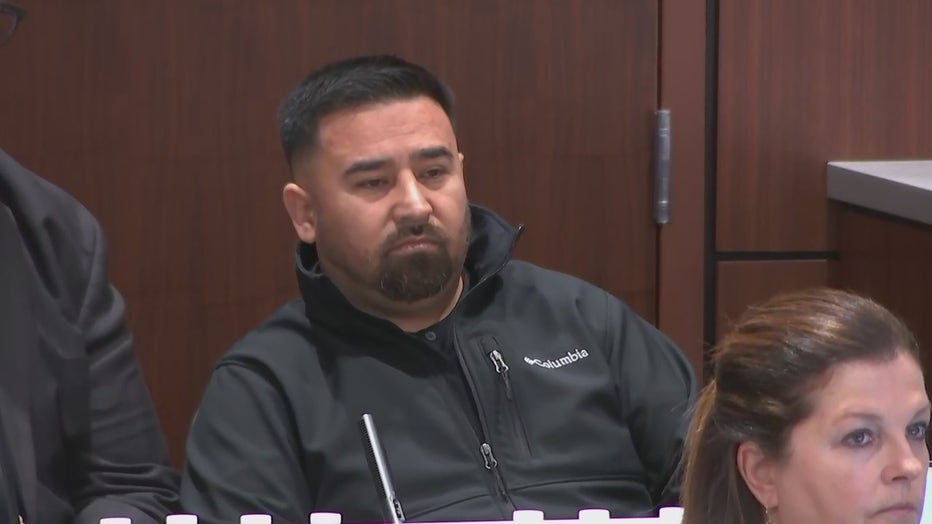
Juan Marquez
Brooks let it slip that Marquez originally told the FBI the SUV was black. Marquez told the court he could not remember what color the truck was that struck him on the parade route.
Brooks questioned Marquez, asking if it was fair to say he did not remember anything at that time. Marquez said "no."
Brooks also questioned Marquez on whether he filed a claim in this incident. He did not remember. Brooks asked if he considered himself an injured party in this incident, and Marquez said "yes." Marquez said he did file a police report but did not remember with which agency. Brooks asked Marquez if he had seen a complaint in this matter or whether he knew the plaintiff.
On cross, Boese asked if Marquez ever heard a horn honking before he was hit by the SUV. He said "no."
Marquez said after he was hit, he was thrown between 15-20 feet and his body "flew through the air." He said his son, David, was also struck. Marquez had to have surgery on his leg.
At this point, Dorow kicked Brooks out of the courtroom after warning him to "stop with the commentary."
Brooks tossed from court
"Are you holding me in contempt?" Brooks asked the judge.
Dorow noted Brooks interrupted 10 times before 10:19 a.m.
"This does not include the commentary under his breath related to a variety of topics," said Dorow.
The judge noted Brooks "objected to every question by the state, and when the court overruled, his commentary became much more audible, clearly showing disrespect for the court and proceedings."
"It has been very apparent that any time the jury has been brought in, Brooks has accused the court of misconduct or bias," said Dorow. "This court is not doing any such thing. He has forfeited his right to be present."
Dorow addressed Brooks' question of contempt, noting that he faces the possibility of life in prison and "contempt is not a viable path for the court."
"It would allow him to profit from his own wrongdoing. There would be a delay in the proceedings. That is not something this court is even willing to do," said Dorow.

Darrell Brooks trial: Defendant tossed from court during witness cross-examination
Judge Jennifer Dorow tossed Darrell Brooks from court on Tuesday morning, Oct. 18 for being disruptive to the cross-examination of his own defense witness. He repeatedly objected to questions posed to the witness. Those were overruled -- and eventually the judge tossed Brooks. He was going to rejoin the proceedings from an adjacent courtroom.
Court resumed at 10:36 a.m. but was again put into recess because it appeared Brooks wanted to return to the courtroom. Around 11 a.m., court returned once again, and Brooks was, indeed, present in the main courtroom.
"I didn’t do anything to be in contempt in the first place," said Brooks. "Removing me from the courtroom is like holding me in contempt."
"I didn’t hold you in contempt," said Dorow.
After being brought back into the main courtroom, Brooks argued jurisdiction again, saying it had yet to be proven on the record; Dorow disagreed.
Detective Jay Carpenter, more Brooks interview testimony
The state then resumed its direct examination of Detective Jay Carpenter and played more of the interviews with Brooks.

Darrell Brooks trial: Interview with Brooks after the Waukesha Christmas parade incident
Darrell Brooks trial: Interview with Brooks after the Waukesha Christmas parade incident

Darrell Brooks trial: More video from interview of Brooks
Darrell Brooks trial: More video from interview of Brooks
In the next interview clip, Brooks talked about his day in Waukesha Nov. 21. Brooks said he came in a Kia with a friend, noting he had a license but not a vehicle.
"My mom doesn’t know how to drive," said Brooks. "She doesn’t have a car."
Prosecutors say Brooks was driving his mother's red SUV in the parade attack.
"Whose car did you drive out here?" Carpenter asked.
"I didn't drive at all," said Brooks.
Brooks talked about meeting with Erika Patterson and watching the Packers game with his friend.
This interview took place Nov. 22, one day after the Christmas parade attack.
"Yesterday was a mistake," said Brooks. "I should have just watched the game."
"You did not come out here in a tan Kia. You have a key in your pocket for a car in your mom’s name. For the love of God, for yourself and family, tell me what happened?" said Carpenter in the interview.
"What am I being investigated for?" asked Brooks.
"We have been cool this whole time…" said Brooks.
"You have lied to us. You came out in the red Ford Escape. You had the key. I want to give you a chance to reset, start over. You aren’t giving us an accurate story," said Carpenter.
"All I want to know is am I charged with anything?" said Brooks. "I’ll tell you anything you want to know."
In his testimony, Carpenter noted that Brooks did not walk to Frame Park to meet Patterson, but rather, took the same SUV that went through the parade route.

Darrell Brooks trial: Defendant asks, "What am I facing?" when questioned by FBI
Darrell Brooks trial: Defendant asks, "What am I facing?" when questioned by FBI
In the next interview clip, Brooks acknowledged the red SUV for the first time.
"It's my mom's car," he said.
In the next clip, Brooks said he was "getting railroaded," again demanding to know what was going on and what he was being charged with.
"If I tell you… will you be straight up with me with everything that I’m facing?" said Brooks.
Carpenter testified that Brooks never told him someone else was driving the SUV.
In the next video clip, Brooks finds out that "a lot of people got hurt" at the parade.
"Are you serious?" asked Brooks. "Like, bad? A stroller? So a kid got hurt?"
Brooks then made a joke and laughed.

Darrell Brooks trial: Brooks shown pictures, video of what happened at the Waukesha Christmas parade
Darrell Brooks trial: Brooks shown pictures, video of what happened at the Waukesha Christmas parade.
Carpenter testified Brooks never asked how any of the injured were doing. Carpenter told the jury Brooks never told them why he drove through the parade or what was going through his mind.
"I let him know people got hurt," said Carpenter. "Brooks was not willing to give clarity and despite us talking about God, what if someone injured his kids, none of those things were anything to make him more willing to speak with us."
Carpenter then showed Brooks a video on his phone, which he later testified showed the SUV going through the parade. Brooks wouldn't watch.
"I understand my life is over," said Brooks. "This is how my story ends."
Brooks: ‘Do I have to be present’ for SUV viewing?
After lunch, Waukesha County District Attorney Sue Opper said she would like to take the jury to see the red SUV on Wednesday afternoon.
Opper argued that, just as a gun would be brought in as evidence in a shooting case, "Mr. Brooks has been charged with a dangerous weapon."
Brooks asked whether he would need to be present for that viewing.
Judge Dorow said she would like him to be present.
Brooks and Dorow then began arguing again about Brooks' name, with Brooks telling the judge he "did not consent" to being called that name and Dorow telling Brooks he had given her no other name by which to call him, and she was using the name on the charging documents.
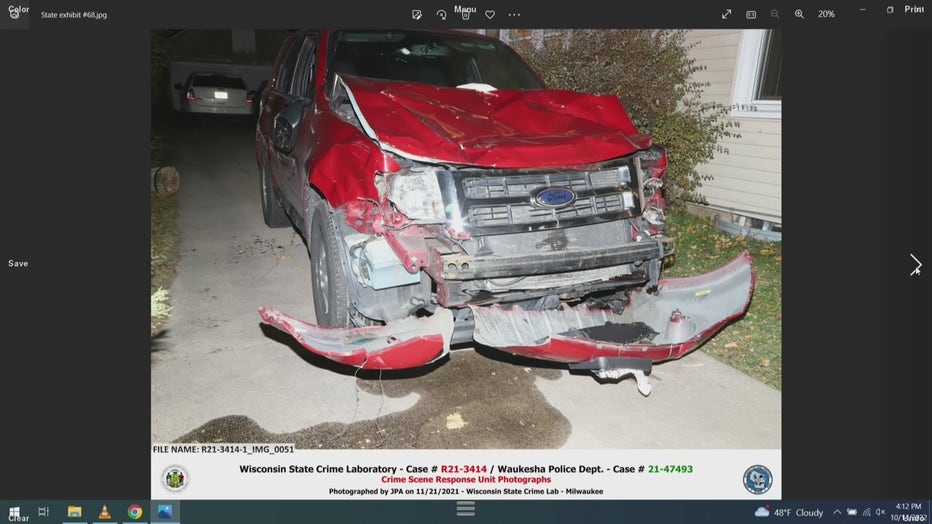
Dorow ended the argument and said she would require Brooks to attend the viewing of the red SUV Wednesday afternoon.
The viewing will be recorded and placed into the record.
Prosecutors and the judge then noted Brooks still needed to provide the court with the time and day for when his witnesses should be present to testify in court. The state again said Tuesday afternoon they were prepared to rest by close of business Wednesday. Prosecutors noted they needed this information from Brooks to give his witnesses notice for time off work, etc. to testify. Brooks was told he could not require all witnesses to show up on the same day.
Brooks was ordered by Dorow to bring to court Wednesday morning an outline of "which witnesses you want Thursday morning, Thursday afternoon, Friday morning and Friday afternoon."
After arguments from Brooks that he shouldn't be required to do this because the state did not give him an outline as to their witnesses, Dorow cut off the discussion and said, "We are going to move on."
Brooks then asked, "Are we going to move on to subject matter jurisdiction?"
Dorow then called Detective Carpenter back to the stand to continue his testimony regarding the interviews with Brooks that began Tuesday morning. As the jury was brought back in, Brooks asked for a sworn affidavit. He continued to make statements as the jury got situated.
Detective Jay Carpenter, Brooks' cross-examination
After Detective Jay Carpenter took the stand, Brooks began his cross-examination.
Brooks asked why the suspect was questioned at the hospital versus the police station. Carpenter noted that Brooks requested medical clearance and "there is a risk" with any prisoner transport, so they wanted to avoid that risk. Carpenter noted that there were four officers, including himself, at the hospital, so they were confident they could secure Brooks.
He also asked Carpenter about standard procedure in detaining people suspected of crimes.
"You just said you try not to assume until you have all the facts. Is it fair to say all the information you had before you were not sure about?" asked Brooks.
"I wasn’t sure if you were the driver initially, but I was sure you were involved," said Carpenter.
"And you knew that to be fact?" asked Brooks.
"Yes. The information provided was that you were involved," said Carpenter.
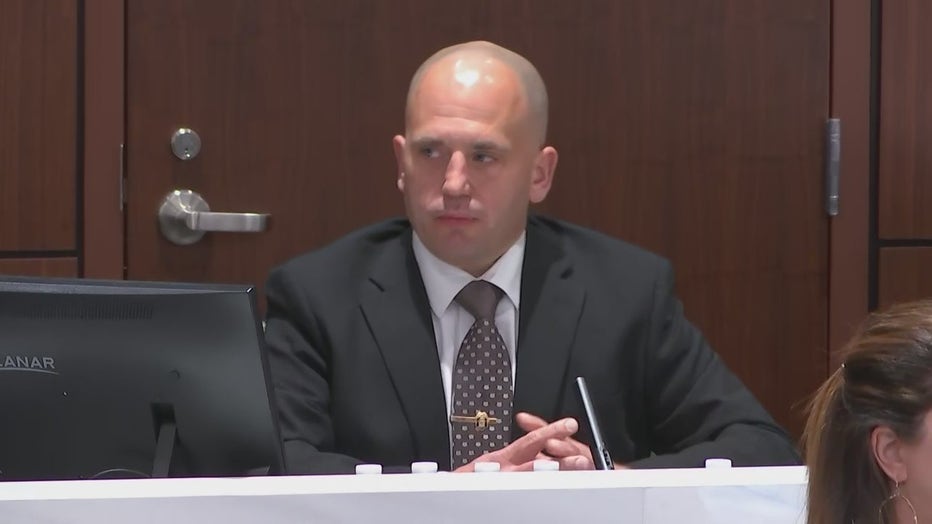
Detective Jay Carpenter
Brooks asked about the significance of the FBI being present during his interviews. Carpenter again said there were concerns this was a terror attack.
Brooks asked what he meant by "this."
"When you drove your vehicle through the parade and struck people..." said Carpenter.
Brooks noted Carpenter didn’t know that at the time as fact. Carpenter said initially, they didn’t know if Brooks was driving, but the investigation showed he was. Brooks says initially, police didn’t provide him that information.
Carpenter was asked if the FBI continued their investigation. The witness noted it was eventually run strictly by Waukesha police. Brooks asked why.
"My understanding is there wasn’t a terrorism link," said Carpenter.
Brooks asked if Carpenter had ever conducted an interrogation with the FBI present, and he said not prior to this interrogation of Brooks.
The defendant referenced the car key found and asked if he, himself, found it. He did not.
"Your items that were located on you during the search were turned over to Detective Stern, and the car key was one of those items," said Carpenter.
Brooks asked if he knew where the items were found.
"No. I know those items were found on you in the search. Maybe not the specific pocket, but I know those officers found those items on you during the search," said Carpenter.
Brooks asked how he knew.
"Because they were turned over to Detective Stern as your property," said Carpenter.
"How do you know where they were found if you weren’t at the scene?" asked Brooks.
"Because I know where the officer searched you, and it’s not reasonable to think they’d be in the grass outside a house in a city that you’re not familiar with," said Carpenter.
Brooks asked if it’s possible the items could’ve been found in the grass. Carpenter said "no."
"Even though… you were not present?" asked Brooks.
"Correct," said Carpenter.
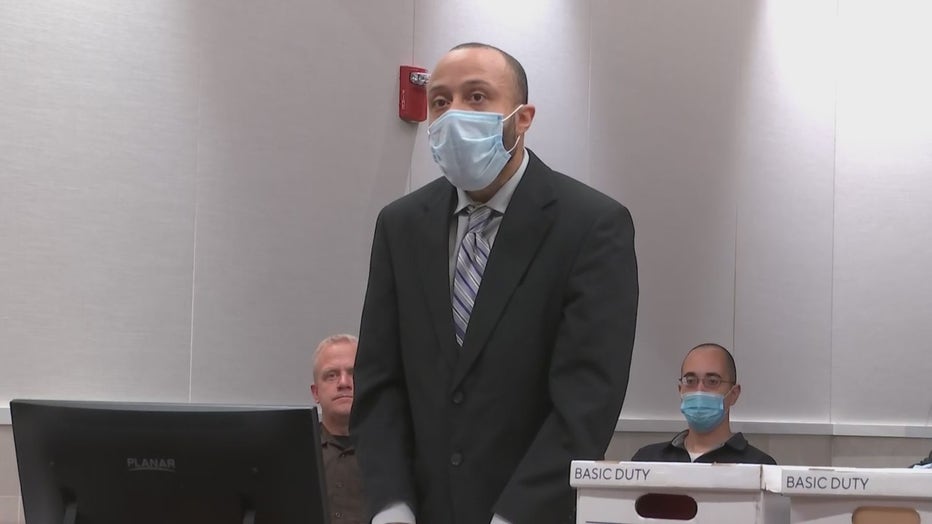
Darrell Brooks in court Tuesday, Oct. 18
Brooks then asked about the suspect being taken for medical clearance.
"Would it be fair to say you cannot know how a person’s body is feeling?" asked Brooks.
"I can’t explain exactly what another’s body is feeling, correct," said Carpenter.
The defendant then asked Carpenter about a comment he made in the interrogation that the FBI was present because they were "short-staffed." Brooks then asked for that portion to be replayed.
"They're just kind of helping out because we're so short-staffed tonight," Carpenter says in the audio recording.
"From hearing the audio… do you recall saying the FBI was present because you were short-staffed?" asked Brooks.
"That is my voice. I don’t recall saying that in the moment, but that is my voice," said Carpenter. "We were just very short on resources with what happened down at the parade route and the mass casualties and the amount of officers it took to secure that location. We were very short on people."
Brooks asked if the FBI is usually present in a "situation of short-staffing." Carpenter said "no."
Carpenter was asked why he would use his phone to record the interrogation at the hospital, "especially one of this magnitude." He said it was because the camera in the room did not have audio. He said he was informed of that by hospital security before the interrogation.

Detective Jay Carpenter
Brooks asked what prompted the interrogation in the hospital room that night.
"The situation down in the downtown area of Waukesha where the mass casualty incident had occurred was very fluid," said Carpenter. "It was still unfolding at that time. We were learning more and more and more about what occurred. We decided to start the interrogation at that time to see if you would be willing to shed light for us on what you did or did not know." He again noted an inherent risk when transporting prisoners.
There was then a discussion about Brooks being read his Miranda rights during the "first interrogation attempt" at the hospital, and Carpenter said, "You indicated you didn't wish to speak with me."
Brooks asked why Carpenter continued to record even though Brooks invoked his Fifth Amendment.
"We are trained in our police department, when you do an interrogation, that the recording is to be left on pretty much until you affect transport…" said Carpenter.
Brooks then questioned his transport to the Muskego Police Department and why the first interrogation (at the hospital) could not have occurred at Muskego PD as the second interrogation did. Carpenter said Muskego was utilized because they had a lockup facility.
"When we arrived at the facility with you, you hadn’t eaten all day. You hadn’t slept, so we wanted to give you an opportunity to eat, sleep, clear your mind and refresh yourself," said Carpenter. "You said you hadn’t eaten and you hadn’t slept. I think a person is more focused when they’re fed and well-rested."
Brooks wants Carpenter's initial hospital interrogation stricken
Judge Dorow then dismissed the court to take up two legal issues -- first, police policy (why Brooks thought it was relevant in regard to his questioning of Carpenter) and second, the questions he was asking, Dorow said, went to a legal issue the court has already determined.
"I didn’t want to make an assumption, but I also didn’t want you to question this witness on what really are legal issues that this court previously addressed regarding the admissibility of interviews," said Dorow.
Brooks said the police policy was relevant because he believed it should be stated for record why Carpenter continued his phone recording despite Brooks invoking his Fifth Amendment right.
"At that point, the interrogation has to stop completely," Brooks said. "I believe that if that’s, in fact, policy, it should be proven. It should be proven that that’s a fact, that it’s a real policy. For all we know, he could just be saying that it’s a policy…"
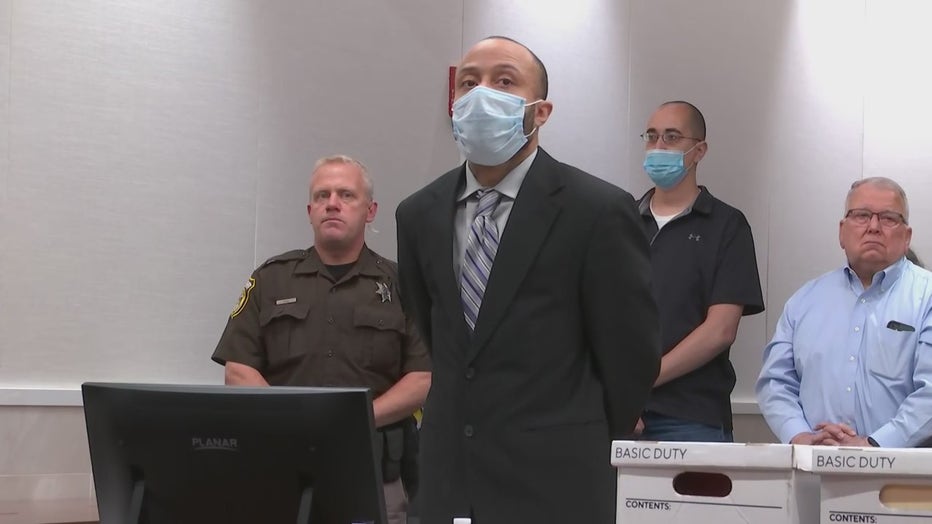
Darrell Brooks in court Tuesday, Oct. 18
The judge said he was assuming facts that weren’t in evidence, and she didn’t see the relevance. She said Brooks was making assumptions.
"Frankly, his conduct isn’t on trial. We’re not here on a police misconduct trial. I’m not saying that some of this information might not be relevant to his credibility...Why do you believe those policies relate to an issue of fact in this case or otherwise go to your defense?"
Brooks said he believed anything related to the first interrogation shouldn't be admitted as evidence per his Fifth Amendment right.
The judge said that was a legal determination she had already made.
"To make this trial about that interrogation, it’s not relevant," Dorow said. "I’ve already ruled on the admissibility. It’s a legal determination."
Judge Dorow said she gave Brooks some leeway in his questioning Carpenter and said she believed he was questioning Carpenter on legal issues that are not relevant, trying to illicit info out of Carpenter that is not relevant.
"I know the law on this area, and I know when a subject invokes their Fifth Amendment… because you only invoked your right to remain silent, they waited to question you until a sufficient amount of time had passed, in addition to a number of other reasons," Dorow said.
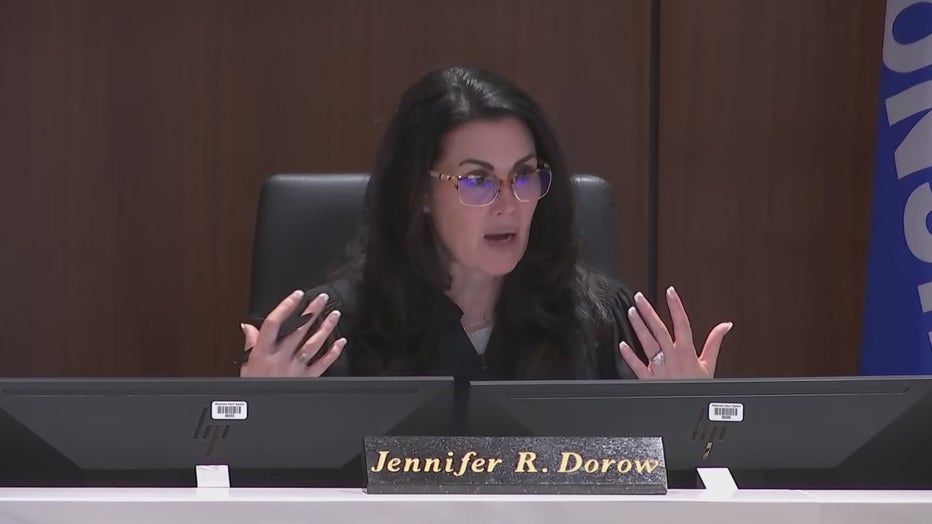
Judge Jennifer Dorow
Dorow pointed out it would’ve actually been his 14th Amendment right at that time.
Deputy District Attorney Lesli Boese said she thought Brooks was asking Carpenter why they didn’t do first interrogation at Muskego.
Brooks said that was exactly what he was getting at.
With that understanding, Judge Dorow said that was fine.

Brooks trial; jury sees defendant's interview with law enforcement
The trial of Darrell Brooks, the man accused in the Waukesha Christmas Parade attack, continued Tuesday with testimony from law enforcement. The jury saw video of law enforcement questioning Brooks.
Detective Jay Carpenter, Brooks' cross-examination continues
When Carpenter came back to the stand, Brooks asked about his transport and interrogation at Muskego PD. Carpenter noted that when the Waukesha PD closed up for renovations, Muskego "was given as an option for us, being we didn't have our own municipal lockup."
As for the second interrogation at Muskego PD, Carpenter said he explained to Brooks that they had more information about the domestic incident before the parade attack, "and that's what I was looking to speak to you about."
Brooks questioned Carpenter about the Miranda rights, and Carpenter said they were read 15 minutes into the interrogation.
"I’m not required to read them immediately… I read them before I asked you any specific questions about that event," said Carpenter.
Brooks asked if there was any reason why he wouldn’t explain the real reason why the detainee was being detained.
"At that point, the (Frame Park) domestic was part of the reason you were being held in custody," said Carpenter.
Brooks followed up by asking if Carpenter had more knowledge about the parade incident at the time of this second interrogation.
"The idea behind the second interrogation was I began with the domestic abuse issues, questioned you about those, and then moved into the parade aspect of the investigation," said Carpenter.
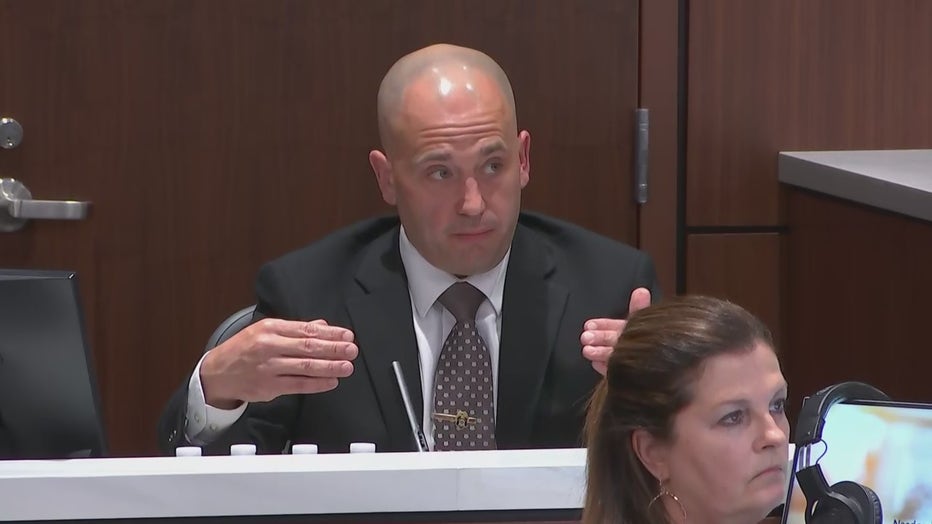
Detective Jay Carpenter
Carpenter noted that part of gauging Brooks' truthfulness was not telling him all the details.
Brooks asked Carpenter why the loitering and prowling allegations (relating to the reports of a man going door-to-door on Elizabeth Street after the parade attack) were "discarded." Carpenter said at that time, they weren’t the primary concern. "Those discussions came to a stalemate," he said, adding that the primary focus became the parade.
Brooks followed up by asking whether there were different reasons given about why the suspect was being detained during both interrogations.
"Domestic abuse is taken seriously, and again, there was more knowledge about the parade," said Carpenter.
Carpenter did admit there was "information I withheld from you" during the interrogations.
"I wanted to be sure the information you gave me was truthful," said Carpenter.
"I think it’s important to note – and this is proven by evidence – you lied to me about your mother owning the vehicle. You lied about coming out here in a possible tan Kia," said Carpenter, adding that Brooks also "lied about being body-slammed by officers" during his arrest on Elizabeth Street.
Brooks asked Carpenter if, during the second interrogation, he believed the detainee would be more willing to speak without the FBI present.
"Yes. It was a sense of how I felt you interacted with me the night before. As I’ve stated in testimony, we had casual conversations, part of those casual conversations were talking about sports you play, sports you enjoy, the Packers game that day. You seemed very calm, very relaxed, how you seem right now, Mr. Brooks, and I sensed how you were with the FBI present," said Carpenter.
The defendant asked Carpenter about his showing a video to the detainee in a "forceful" manner.
"I was attempting to show you a video of when you drove your vehicle through the parade route," said Carpenter. "I felt it was very important for you to see the damage that was caused by the incident. You were asking for more information, so we attempted to show you more information."
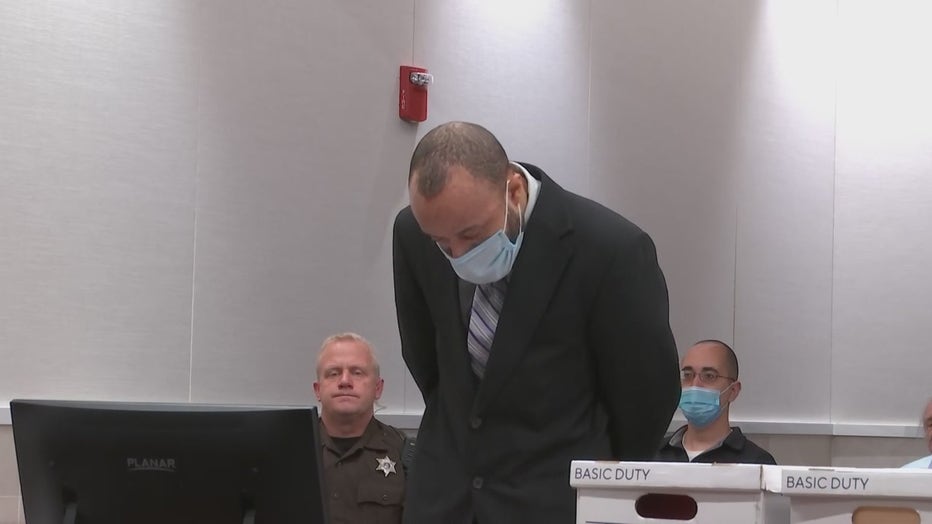
Darrell Brooks
Brooks asked about Carpenter serving search warrants at the Waukesha County Jail. Carpenter said there was a search warrant for Brooks' jail property, such as his red T-shirt, his blue jeans and his socks that he was wearing on Nov. 21 and 22. Carpenter noted possible DNA evidence in relation to the parade attack.
Brooks also asked Carpenter about his response to Elizabeth Street.
"I believe you were already in the back seat of a squad car," said Carpenter. You were detained."
"The suspect," said Brooks.
"The suspect is you, Darrell Brooks," said Carpenter.
There were then questions from Brooks about phones that were seized and the property that was taken from Brooks' cell and how that property was secured.
Carpenter noted other law enforcement watched the Muskego interrogation as it happened.
"Again, the FBI was present in a different room because we still didn’t know if there was a terrorism nexus at that particular point," said Carpenter.
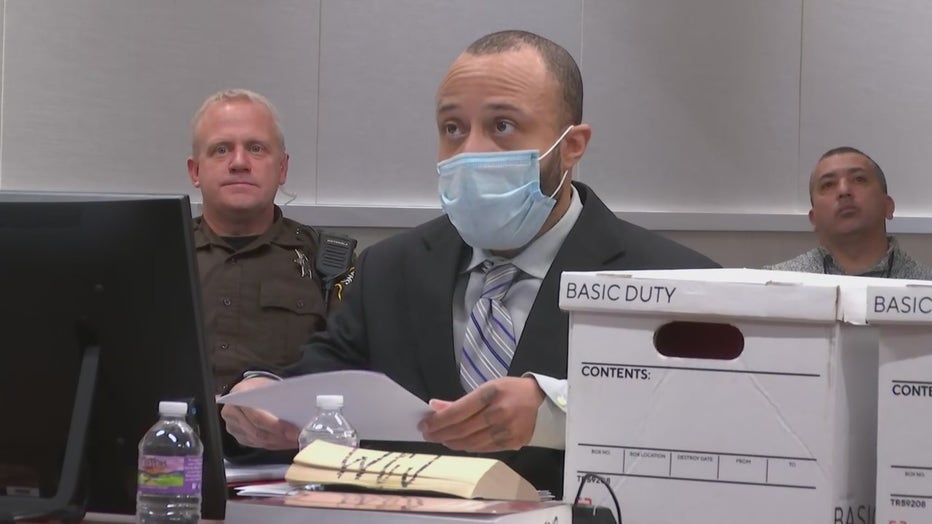
Darrell Brooks in court Oct. 18
Brooks' last question to Carpenter was whether there were reports of multiple suspects in connection with the parade incident.
"Yes. It was chaotic early on. There were reports of possible multiple suspects early on," said Carpenter.
On re-direct, Boese pulled up a Miranda statement form and asked Carpenter whether that is filled out every time they question someone. Carpenter said "yes."
Boese then asked about "excited utterances," and Carpenter explained that this involves statements made by an individual of their own accord and not in response to any question. Carpenter said "yes" when asked if it is important to capture these utterances and "yes" when asked if that's one reason to consider a recording after an interview is over.
Boese then asked if police need a passcode to enter a phone. Carpenter said that makes it easiest for investigators, but they have ways around it. He said "yes" when asked if he's gotten phones back that could not be accessed without a code. He said in that case, there is "certainly a possibility" that they would not be able to access that phone's content.
Carpenter was then asked by Boese if he takes notes when dictating his police reports through the phone (the reports that are later typed up). Carpenter said "yes."
Boese asked if Brooks ever said there was anyone else in the red SUV, possibly Erika Patterson. Carpenter said "no."
Carpenter was asked if police make charging decisions in cases like this, and he said "no." Boese followed up by asking if, when Brooks asked what he was being charged with, Carpenter had no say over that. Carpenter said correct.
That ended testimony Tuesday, shortly before 5 p.m.
SIGN UP TODAY: Get daily headlines, breaking news emails from FOX6 News
Christmas parade attack
Prosecutors say Brooks drove a red SUV through the parade route on Nov. 21, 2021, killing six and injuring more than 60 others.
On Nov. 21, 2021, according to prosecutors, Brooks met up with his ex-girlfriend in Frame Park, the same woman he is accused of running over with his red SUV earlier in November 2021. She told police they argued in his SUV before he started driving, and he "was driving around with one hand and striking her in the face with his other hand." She eventually got out and called her friends for help.
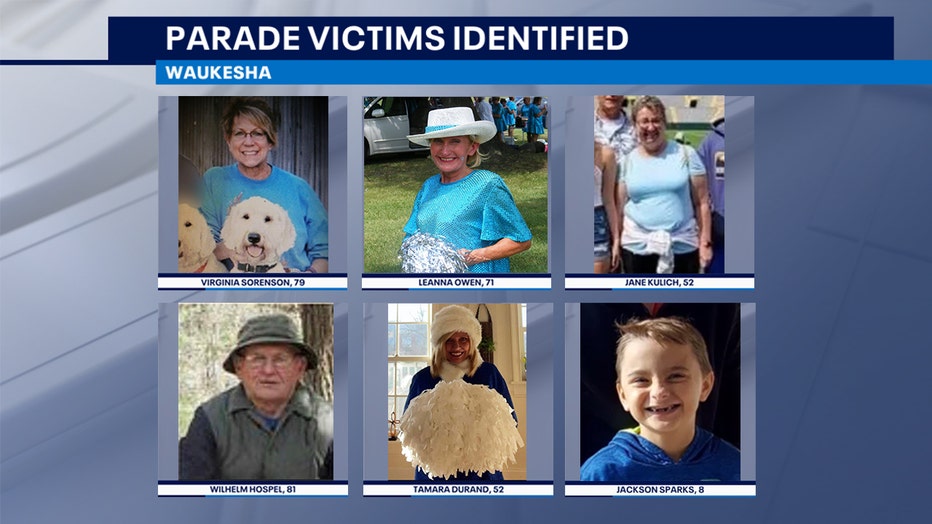
Waukesha parade attack victims identified
Soon after that, according to prosecutors, Brooks drove that red SUV through the parade route, killing Jackson Sparks, 8, Virginia Sorenson, 79, LeAnna Owen, 71, Tamara Durand, 52, Jane Kulich, 52 and Wilhelm Hospel, 81. More than 60 others were hurt.

